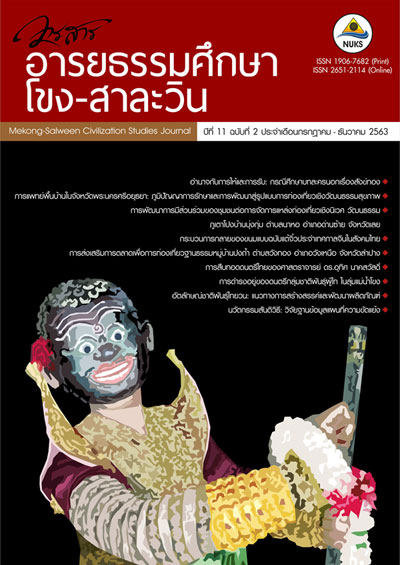Power of Giving and Receiving: A Case Study of Lakhorn Nork “Sang Thong”
Main Article Content
Abstract
The purpose of this research was to analyze the power relation of giving and receiving in Lakhorn Nork “Sang Thong”in the Ayuthaya edition and King Rama II. The frameworks for the analysis were based on the theories of Max Weber, Michel Foucault, Karl Marx, and Antonio Gramsci. It was found that there were five aspects that determined the power relation of giving and receiving: 1. the power of the sacred in relation to giving and receiving: the hegemony of the belief and the sacred, 2. the power of love in relation to giving and receiving: the matriarchal power in patriarchal space, 3. the power of resources in relation to giving and receiving: the beneficence of benefits, 4. the power of the rightful authority in relation to giving and receiving: the hegemonic power, and 5. the power of merit in relation to giving and receiving: the good karma of Thai Buddhism in Buddhist heaven. Consequently, there were two types of giving and receiving. The first one was the condition of giving presupposed by the receiving; one could only give when was asked for. The other one was the condition of giving without any receiving. The power and giving and receiving revealed the hegemony in terms of class, social role, and gender norms. Both the giver and the receiver needed to receive some benefits. Therefore, the role of the giver and the receiver was always interchangeable based on the position of benefits. However, the power of merit, the absolute and rightful authority, and the sacred were in support of the hegemony that limited the spatialization of matriarchal power in the patriarchal space. Moreover, the power and giving and receiving were related, while the discourse of giving and receiving was only possible within this field of power. The existence of such field could only be realized through the empirical practice of giving and receiving.
Downloads
Article Details
References
Anantasant, S. (1972). The Ayudhaya Lakhon Nok Manuscripts. (Master’s thesis). Chulalongkorn University,
Bangkok.
Boonkachorn, T. (2010). In the Light of Comparative Literature (Comparative Literature: Paradigms
and Methods). Bangkok: Chulalongkorn University.
Chabang-bon, J. (2005). Sang Thong (Cartoon Version). Bangkok: Sky Books.
Chaithong, W. (2010). Antonio Gramsci: Cultural Marxism and Superstructure Study. Retrieved October 14,
, from https://armworawit.wordpress.com/2013/11/28
Chatranatra, B. (1975). Lakhon Nok by King Rama II: A Critical Study. (Master’s thesis). Chulalongkorn
University, Bangkok.
Chitchamnong, D., Ruengruglikit, C. and Sujjapan, R. (1989). Thor Mai Nai Sai Nam: 200 Years of Thai
Literary Criticism [History of Thai Literary Criticism from 1782 to 1982]. Bangkok: Ponpankarn
pim.
Coser, Lewis A. (2004). Sociological Theories: Max Weber [ Masters of Sociological Thought: Ideas in
Historical and Social Context]. In A. Korsriporn, (Trans.). Bangkok: Thammasat University.
Duang-Wiset, N. (n.d.). The Glossary of Anthropology: Power. Retrieved October 11, 2019 from
https://www.sacor.th/databases/anthropology- concepts/glossary/116
Fine Arts Department. (2002a). Lakhorn Nork Plays by King Rama II. (10th ed.) Bangkok: Sinlapabanna khan.
----------- . (2002b). Literature of the Ayutthaya Period Vol 3. (2nd ed.) Bangkok: Fine Arts Department.
Khrer-thong, P. (2015). The Hidden Meaning in Literature. Bangkok: Aan
Krumram, P. (2011). Humour in Sang Thong the Drama Composed by King Rama II. (Master’s thesis).
Srinakharinwirot University, Bangkok.
Mahavarakorn, S. (2004). The Transformation of Sang Thong. Research Report, Srinakharinwirot University,
Bangkok.
Mahavarakorn, S., & Yenbuttra, P. (2017, July). Supplementary Reading Book of Lakhon Nok “Sang Thong” for Chinese Students. Journal of Thai Studies. 13(2), 51-72.
Naklai, A. (2016). The Ugly Characters in Thai Literature. (Master’s thesis). Silpakorn University, Nakhon
Pathom.
Na Nakhon, P. (2002). History of Thai Literature. (13th ed.) Bangkok: Thai Watana Panich.
Office of Basic Education Commission Ministry of Education. (2011). Thai Language Textbook Serial: Language for Life and Dramatization of Literature for Prathom Suksa 5 Level. (2nd ed.) Bangkok: Academic and Standard Education Division.
Panya, W. and Vivattanaseth, P. (2017, April). Figurative Rhetoric Style in Lakorn Nok, Authored by
King Buddhaloetlanapalai. Journal of Education Khon Kaen University (Graduate Studies Research). 11(2),
-204.
Phalapiromya, R. (1977). An Analytical Study of Sang Thong. (Master’s thesis). Chulalongkorn University, Bangkok.
Pilannowad, O. (2011). Discourse Analysis Frameworks and Thai Cases. Bangkok: Chulalongkorn University.
Pooyongyuth, K. (n.d.). From Weber’s Concept of Charismatic Authority to the Javanese and Authority Charismatic Leader of Thai Politics after 1997 Asian Financial Crisis. Retrieved October 20, 2019, from
https;// www.academia.edu/11302608
Prachakul, N. (2015). Prelude. From Les Corps Dociles. In T. Phokkhatham, (Trans.). Bangkok: Khop-Fai.
Raod-art, P. (2012, February). Intertextuality from Folk Tale to Television Cartoon and Folk Serial: A Case of
“Sungtong”. JC Journal. 4(2), 46-72.
Royal Institute. (2003). Royal Institute Dictionary 1999. Bangkok: Nanmeebooks.
Saeng-arunchalermsuk, S. (2018, May). Phra Sang: The Hero’s Journey. Journal of Humanities and Social
Science Suratthani Rajabhat University. 10(2), 185-206.
Suwanpratest, O. (2017, June). The Assumption of the Origin of the Thai Folktale “Sang Thong”. Chophayom
Journal. 28(2), 13-24.
Thai PBS. (Producer). (2016). Classic Thai Film: Sang Thong. [Television series episode]. Retrieved October, 14,
from https://program thaipbs. or. th/ClassicThaiFilm/episodes/41068
Vajirayana. (n.d.). Lakhorn Nork “Sang Thong”. Retrieved October 14, 2019, from https://vajirayana. org/Bot
Lakhorn Nork Sang Thong
Wonglakorn, J. (2018, January). The Biopower in Michel Foucault’s Thought. Panidhana: Journal of Philosophy
and Religion. 14(1), 135-162.


